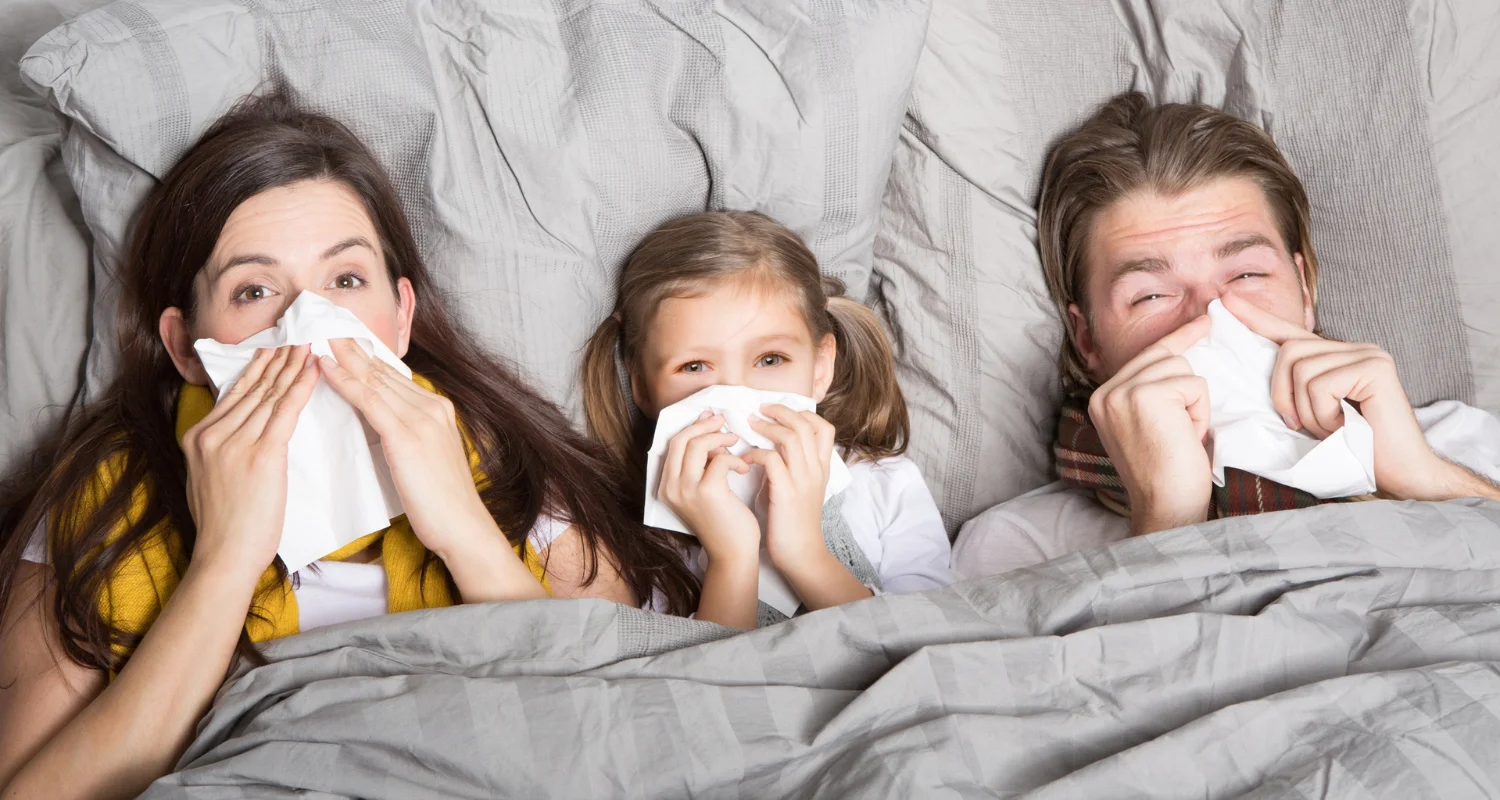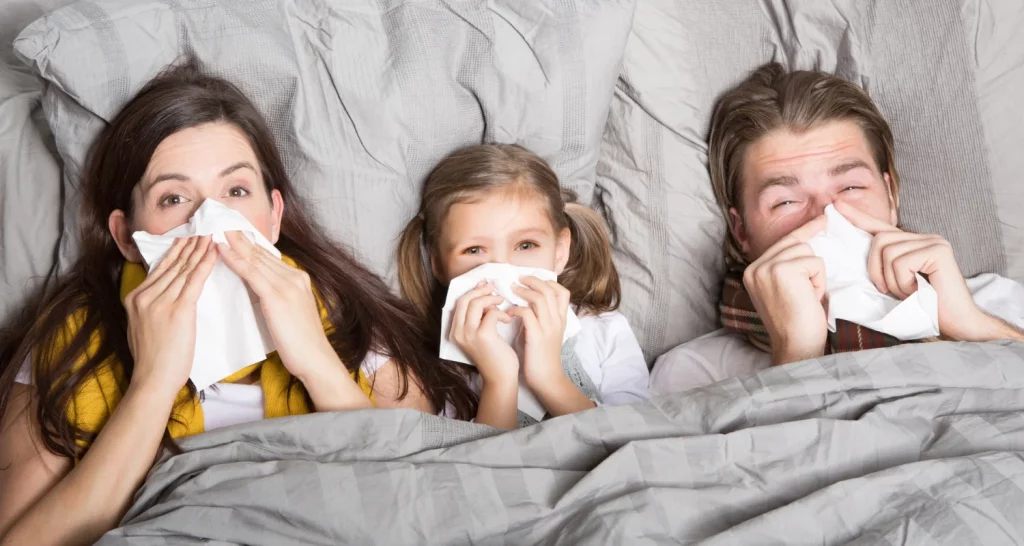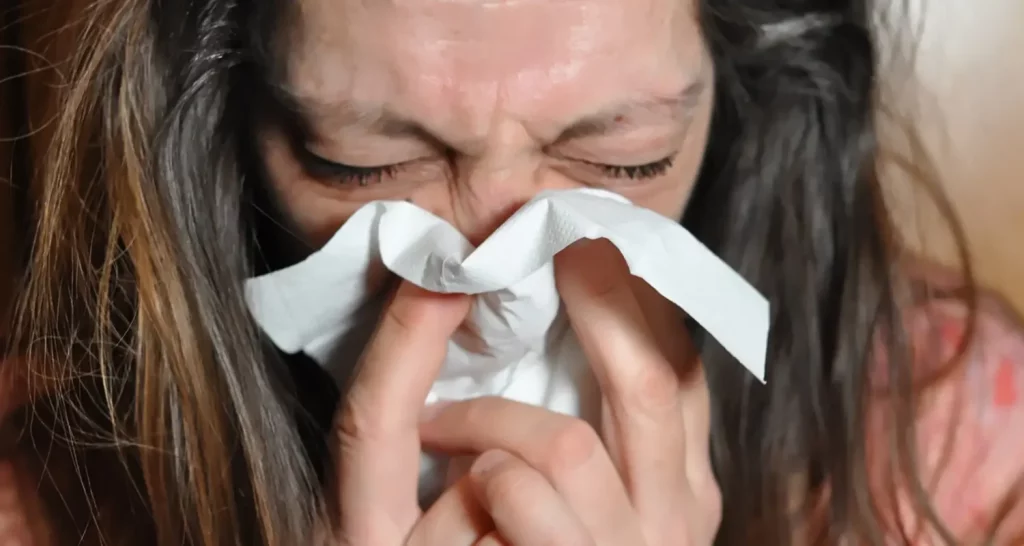Last Updated on: 19th September 2025, 12:43 pm
Cold and Flu Season
These days, discerning the cause of an illness can be especially unsettling. Both the flu, caused by the influenza virus, the common cold, and now COVID-19, are common respiratory infections in humans that share similar symptoms such as coughing, sneezing, and fatigue. However, there are crucial differences between them.
The common cold and flu are highly contagious and mainly affect the respiratory tract. While cold symptoms are usually milder and improve within a week to 10 days, flu symptoms are more serious and can lead to serious complications such as pneumonia, bronchitis, and sinus or ear infections. Differentiating between these diseases and COVID-19, caused by SARS-CoV-2, is essential for adequate treatment and to prevent the spread of the disease. All are transmitted through small particles expelled when sneezing, coughing, or talking; it can be asymptomatic but still contagious.
Although the symptoms of a cold are usually mild, including a runny nose, cough, and sore throat, they do not come with the fever and body aches typical of COVID-19 and the flu. Cold treatments focus on symptomatic relief, such as rest, hydration, and over-the-counter medications. Nasal rinses, using processed water such as distilled or boiled water, and natural remedies such as honey for coughs, may be helpful.
Knowing the mechanisms behind the symptoms of these diseases is crucial, although our current understanding is limited compared to the extensive information on the molecular biology of the viruses involved. Accurate identification of the disease not only helps in effective recovery but also prevents the spread of the virus to others. Therefore, it is vital to be informed and consult with health professionals for a proper diagnosis and treatment.
Differences Between the Signs and Symptoms of a Cold and the Flu
The flu and colds, both affecting the respiratory system, present symptoms that can be easily confused, although those of the flu tend to be more severe. For a better understanding, the symptoms and characteristics of each are detailed here using bullets:
Flu
Caused by different viruses, with more severe symptoms. Common symptoms include:
● High fever
● Severe headaches
● Persistent cough
● Nausea
● Intense body pain
● Symptoms tend to appear suddenly
● Frequent chill.
● It can significantly interfere with daily activities
Common cold
Caused by several viruses, but with similar symptoms to each other. Common symptoms include:
● Mild body aches
● Mild or non-existent headache
● Cough (variable)
● Nasal congestion and discharge
● Symptoms are usually milder and do not usually include fever
● Less likely to interfere with daily activities
● Treatment with first-generation decongestants and antihistamines
Similarities and cautions:
There may be difficulty differentiating between flu and cold due to shared symptoms. It is important to take precautions to avoid infecting or being infected. Symptoms of the common cold can be classified as “early” (sneezing, rapid onset) and “late” (malaise, cough, slow onset). Early symptoms appear rapidly after 1 to 2 days, while late symptoms develop slowly over several days and may persist up to a week after initial exposure.
It is essential to watch for warning signs that may indicate a more serious condition, such as high fever, difficulty breathing, and symptoms that persist or worsen over time. In any case, a medical consultation is recommended when the symptoms become severe or worrisome.
Stephen Russell, MD, an Associate Professor of Medicine at the University of Alabama at Birmingham, notes that “common colds usually make you feel sick, but they shouldn’t interfere with daily activities.” While most colds don’t require a visit to the doctor, they can turn into something more serious. Some warning signs include a high fever, difficulty breathing, and symptoms that last more than 10 days and get worse over time, or get better initially but then get worse again.
How does a Cold Affect Dental Health?
Colds, in addition to causing symptoms such as a runny nose and general discomfort, can also affect our oral health in several ways. Below are the impacts that a cold can have on oral health:
Sugar intake in medications:
Medicines to relieve cold symptoms, such as a runny nose, headache, or fever, often contain sugar to improve their taste. Of note, this sugar is the main food for bacteria that damage tooth enamel and infect teeth.
Saliva alteration:
Some medications may require gastric protectors, thus affecting the composition of saliva in the mouth. This can make saliva more acidic, damaging tooth enamel and causing gum irritation.
Dry mouth:
The loss of fluids due to the constant dripping of mucous membranes and the side effects of certain medications can reduce saliva production, leaving the mouth more unprotected.
Weakening of the immune system:
The cold affects the immune system, making the mouth more vulnerable to attacks by infectious microorganisms, which can cause inflammation of the gums and weakening of the teeth.
Consumption of hot drinks and dental corrosion:
Hot drinks consumed to relieve cold symptoms, such as herbal teas and citrus juices rich in vitamin C, can hurt tooth enamel, especially when sweetened with sugar.
Risk of dental damage from sneezing:
Sneezing can cause bumps on teeth, leading to possible breakage or damage, especially if you lose control over the sneeze.
Pain in the upper molars due to inflammation of the sinuses:
Inflammation of the sinuses, common in colds and flu, can cause pain in the upper molars due to pressure near the nerves of these teeth.
Increase in dry mouth due to nasal congestion:
The nasal congestion typical of colds and flu can lead to increased mouth breathing, increasing dryness, and the risk of irritation in the mouth.
It is important to take these effects into account and take preventive measures, such as maintaining good hydration and taking care with the choice of medications, to minimize the impact of the cold on oral health.
How can I Protect my Mouth from the Cold or Flu?
During cold and flu season, it is important not to neglect oral health, as these illnesses can significantly affect our mouths. Here are some key recommendations to keep your teeth healthy:
Maintain good oral hygiene:
● Even if you are sick and feel exhausted, it is essential to brush and floss your teeth. Remember to brush at least twice a day, spending at least two minutes each session.
● Tooth brushing should be thorough, especially after eating, to eradicate the presence of bacteria and viruses.
Hydrate sufficiently:
● Staying hydrated is crucial, as your body needs extra fluids to fight infection. Additionally, many medications can cause dry mouth, which increases the risk of cavities and gum disease.
● It is recommended to drink at least six to eight glasses of water a day. Soups and juices are also beneficial, but keep in mind the ingredients of the latter.
Take care of your toothbrush:
● Replace your toothbrush after recovering from a cold or flu to avoid reinfection. During illness, it is important to keep your toothbrush clean and not mix it with those of other family members.
● It is suggested to change your toothbrush every three months and more frequently during and after an illness.
Salt water gargles:
● Gargle with a salt water solution (a tablespoon of salt in a glass of warm water) to decrease bacteria in the mouth and throat, which helps fight bad breath and plaque.
Choose sugar-free medications:
● Many cold and flu medicines, including cough drops, contain sugar. Opt for sugar-free options or those with natural ingredients to avoid cavities and gum damage.
Attention to oral problems:
● If you have already been diagnosed with an oral problem, treat it immediately and do not postpone it. The viral load from a cold or flu can weaken the immune system and complicate these problems.
Use antiseptic mouthwashes:
● Mouthwashes with cetylpyridinium chloride, chlorhexidine in low concentrations, or diluted hydrogen peroxide may help reduce bacterial or viral buildup in the mouth.
Cover your mouth when coughing or sneezing:
● Use disposable tissues and change masks regularly to avoid spreading the virus.
It is vital to take the above care into account during the cold and flu season, not only to overcome the illness more calmly but also to maintain optimal oral health. Maintaining good oral hygiene is essential, as there is a direct connection between oral health and general physical health.
Conclusion
During cold and flu season, it is essential not only to focus on treating general symptoms but also to pay attention to oral health. Maintaining good oral hygiene, such as thorough brushing and flossing, is crucial to preventing further complications. Proper hydration and the use of sugar-free medications help protect against dry mouth and cavities. Additionally, it is important to regularly change your toothbrush, especially after an illness, to avoid reinfection.
Using antiseptic mouthwashes and gargling with salt water can be effective in reducing the presence of bacteria and viruses in the mouth. These practices, combined with preventive measures such as the proper use of masks and attention to existing oral problems, will ensure comprehensive care during these seasons, supporting not only oral health but also the general health of the body.
Frequently Asked Questions
What causes toothache during a cold?
When you experience a cold, flu, or sinusitis, especially with symptoms like congestion and sinus pressure, you may feel pain in your teeth. This is because the sinuses, teeth, and nerves are located very close to each other, which means that the pressure and pain in the sinuses can radiate to the mouth.
Is it advisable to visit the dentist during a cold?
The choice to go to the dentist while you have a cold depends upon the individual patient. If you feel well and do not have fever or flu symptoms, you might consider keeping your dental appointment. However, if you feel unwell, it would be advisable to schedule a visit to take care of your oral health.
Can the flu cause dry mouth?
Dryness in the throat, as well as a feeling of irritation or scratchiness, can be symptoms associated with the flu. This condition is a respiratory illness caused by the influenza virus.
How does sinusitis impact oral health?
Sinusitis, along with other similar respiratory conditions, can cause irritation to spread from the sinuses to the upper teeth. This type of pain can affect multiple teeth on the same side of the mouth, which could raise concerns about dental problems such as cavities or tooth sensitivity.
Share:
References
1. Eccles Ron. (2005). Understanding the symptoms of the common cold and influenza. Infectious Diseases, The Lancet.Volume 5, Issue 11, November 2005, Pages 718-725. https://doi.org/10.1016/S1473-3099(05)70270-X
2. Delta Dental (Oct, 2021). 5 dental health tips for cold and flu season. https://www1.deltadentalins.com/wellness/preventive-care/articles/cold-and-flu-dental-health.html
3. NIH News in Health. (Jan, 2022). Is It Flu, COVID-19, Allergies, or a Cold?. https://newsinhealth.nih.gov/2022/01/it-flu-covid-19-allergies-or-cold
4. Erinn Connor. (Sep, 2023). What Is the Difference Between a Cold and the Flu? Symptoms, Causes, Diagnosis, Treatment, and Prevention. https://www.everydayhealth.com/flu/guide/
5. Meola Jhon. (Feb, 2020). Caring for Oral Health during Cold and Flu Season. Dental Associates of New England. https://www.bostonsmile.com/blog/2020/02/06/caring-for-oral-health-during-203741
6.Dental Care Center. (Mar, 2022). Dental Care During Cold and Flu Season. https://www.mycarolinadentist.com/dental-care-cold-flu-season/
-
Nayibe Cubillos M. [Author]
Pharmaceutical Chemestry |Pharmaceutical Process Management | Pharmaceutical Care | Pharmaceutical Services Audit | Pharmaceutical Services Process Consulting | Content Project Manager | SEO Knowledge | Content Writer | Leadership | Scrum Master
View all posts
A healthcare writer with a solid background in pharmaceutical chemistry and a thorough understanding of Colombian regulatory processes and comprehensive sector management, she has significant experience coordinating and leading multidisciplina...



















